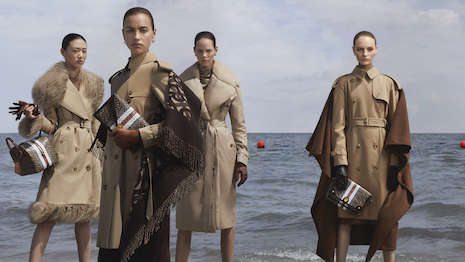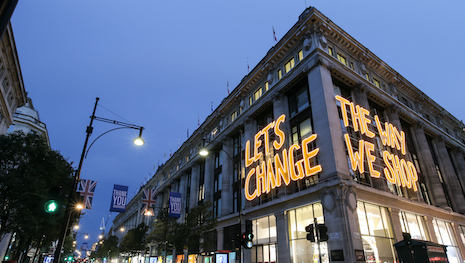- About
- Subscribe Now
- New York,
September 25, 2020

 British fashion label Burberry was a charter signatory to Walpole's Sustainability Manifesto to ensure sustainable practices throughout the organization. Image credit: Burberry
British fashion label Burberry was a charter signatory to Walpole's Sustainability Manifesto to ensure sustainable practices throughout the organization. Image credit: Burberry
NEW YORK – The value of sustainability in the luxury industry has not been diminished despite the challenges brought on by the coronavirus pandemic.
In a fireside chat at the Future of Luxury eConference, the cofounder of Positive Luxury explained how the pandemic has put more pressure on brands to focus on sustainability. At the same time, companies have an opportunity to reevaluate their strategies and reorient themselves around sustainability efforts.
“The big change that I've seen is that the reason why companies want to invest in sustainability is not so much because consumer demand, but actually, because the investment community is really looking at how companies are performing, according to their sustainability investment,” said Diana Verde Nieto, cofounder of Positive Luxury. “Better performing companies, from a financial perspective, are those companies that have invested in sustainability and sustainability innovation.
“Those actually have become much more resilient, and actually will become less risky in the future to invest in because they are looking at how they can actually protect those supply chains,” she said.
Future of Luxury eConference was produced by Luxury Daily
People and planet
According to Ms. Nieto, brands have historically been reluctant to invest in sustainability initiatives because of a “say-do” gap regarding what consumers say they want and what they actually do or buy. This gap has narrowed as consumers become more values-oriented.
“When I talk about sustainability, I’m not talking about supply chains,” Ms. Nieto said. “I’m talking about we defining the culture of the business, the kind to go beyond profits.”
 Selfridges is launching its Project Earth initiative, which addresses materials, models, mindsets. I . Image courtesy of Selfridges
Selfridges is launching its Project Earth initiative, which addresses materials, models, mindsets. I . Image courtesy of Selfridges
The pandemic has brought to light how important teams are to brands, Ms. Nieto explained, referencing the triple bottom line of planet, people and profits. She predicted that the most resilient companies will be those that prioritize their employees’ mental and physical well-being.
With ordinary everyday life put on pause around the world, Ms. Nieto said this is a good time for brands to innovate and embrace technology without as much pressure. This may mean experimenting with digital events or improving ecommerce platforms, while keeping sustainability at the center.
“Failing quickly is something that companies are feeling a lot more comfortable with,” said Ms. Nieto. As experiential luxury stagnates due to the pandemic, brands have to experiment with new ways to engage consumers.
“COVID has given us the ability to stop and think and try things in a new way,” she said. “We cannot run businesses without putting people and planet at the heart of it.”
Sustainable efforts
Luxury is not waiting to continue to make commitments toward sustainability. Efforts range to consumer-facing to more inward changes within organizations.
Walpole, the sector body for British luxury, has launched its Sustainability Working Groups as online forums to discuss eco-conscious behavior that consumers are increasingly expecting from brands.
The move comes eight months after the London-based organization introduced its British Sustainability Manifesto. More than 50 luxury brands have signed up to follow sustainable practices across their entire organization, notwithstanding the pressures from the ongoing COVID-19 pandemic (see story).
British department store chain Selfridges is also building on its reputation for sustainability with a bold new initiative.
Through “Project Earth,” Selfridges hopes to change how shopping is done by 2025 by focusing on environmentally-impactful materials and circular retail models. The project is also guided by Selfridge’s commitment to science-based targets and achieving net-zero carbon by 2050, under the guidelines of the Paris Agreement (see story).
“I think that next year, 2021 2022, there is light at the end of the tunnel,” Ms. Nieto said. “And the companies are investing now and and putting the work now into sustainability are going to be the winners of the future.”
Share your thoughts. Click here